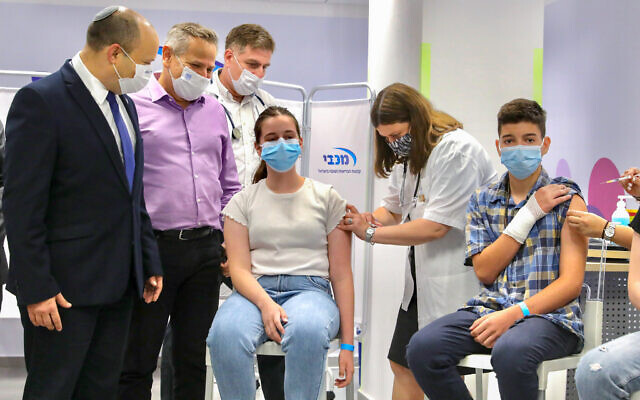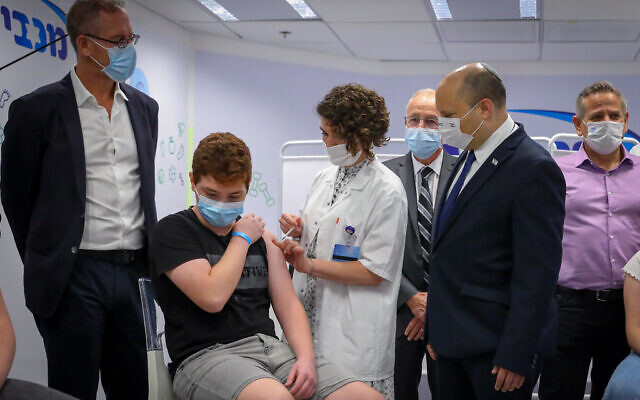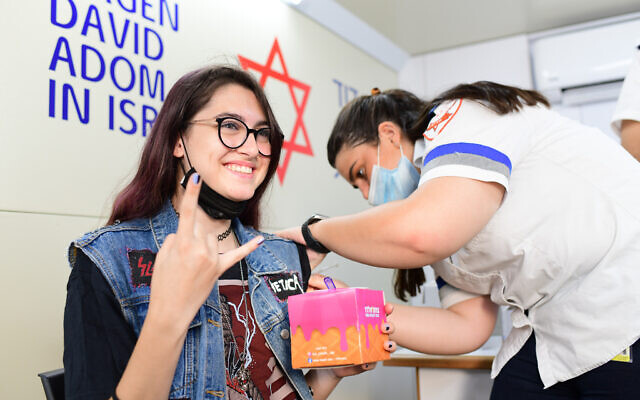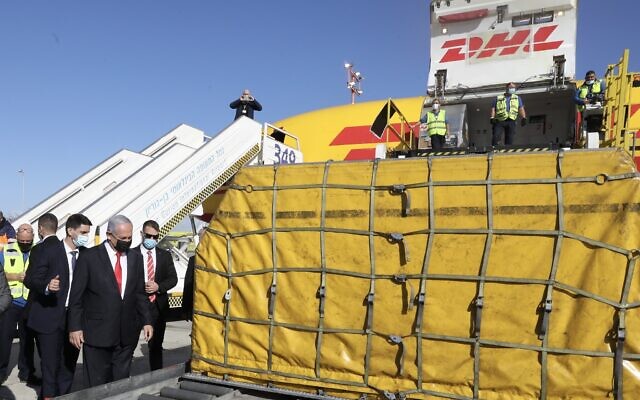PM Bennett instructs Health Ministry to promote medical studies into long-term efficacy of Pfizer vaccine to provide decision-makers with ‘vital information’ on booster shots

Israel’s Health Ministry released data on Monday showing that the Pfizer-BioNTech COVID vaccine appears to largely prevent hospitalization and serious cases, but is significantly less effective against preventing the spread of the Delta variant of the coronavirus.
According to the ministry, the Pfizer vaccine’s effectiveness in preventing symptomatic COVID-19 has dropped by some 30 percent to 64%, given the spread of the Delta variant. The data shows that during May, when the strain was less prevalent, the vaccine was 94.3% effective.
The Delta variant, which is believed to be twice as contagious as the original strain of COVID-19, is thought to be responsible for 90% of new cases in Israel over the past two weeks.
The data, however, also shows that the vaccine is still highly effective against preventing serious symptoms and hospitalization. During May, that figure stood at 98.2%, and during June, it was 93%.
On Monday evening, the Health Ministry said that 369 people had been diagnosed with coronavirus since midnight, bringing the total number of active cases in the country to 2,766.
There were 70 people hospitalized and 35 in serious condition. A week ago there were just 22 people in serious condition.

Amid the rise in COVID cases across the country, Prime Minister Naftali Bennett along with Health Minister Nitzan Horowtiz instructed the Health Ministry on Monday to promote two medical studies on the need for a third vaccine shot against the coronavirus, which they said will provide decision-makers with “vital information.”
The Prime Minister’s Office said that the studies, which will be overseen by the head of public health services in the Health Ministry, Dr. Sharon Alroy-Preis, will “evaluate the efficacy of the vaccine and the rate at which it wears off over time.”
One study will examine the effectiveness of the vaccine over time in various age groups and in various states of health. The other will examine cellular immunity (an immune response not involving antibodies) over time.
On Sunday, it was reported that the Health Ministry will recommend immunocompromised Israelis take a third dose of the Pfizer-BioNTech vaccine, even though the pharmaceutical company has not yet sanctioned the booster shot.
Health officials are concerned by data that shows immunocompromised people develop an insufficient antibody response from the two-shot vaccine to shield them from the virus.
Immunocompromised individuals include organ transplant recipients and cancer patients.
On Monday, however, the Health Ministry clarified that “there is no recommendation or decision at this stage to vaccinate the general public in Israel with a third dose.”

Warning of the dangers posed by the Delta variant, opposition leader Benjamin Netanyahu last week urged Bennett and Horowitz to start giving Israelis a third coronavirus vaccine dose in August, despite Pfizer tests on the third dose having not yet been completed.
Netanyahu said in a video released on his social media channels that “from conversations I’ve had with some of the best experts in the world, I believe the third vaccine [dose] should be given to the over-50 population starting in August, in order to finish the task by the end of September.”
He said that no one currently knows when a drop in immunity will leave the population susceptible to infection once again.
“The price of being late… could be deadly and cost many lives,” he said.
Israel purchased millions of vaccines from Pfizer and was among the first countries to receive them late last year. Despite having millions of unused doses, it inked a deal in April under Netanyahu for 18 million more doses, in case they were needed for booster shots. Those doses have yet to arrive.
Israel’s stockpile of Pfizer vaccines, however, is slated to expire at the end of July and the government is working on efforts to prevent doses from being trashed.

The Prime Minister’s Office said on Sunday that Bennett has held several conversations in recent days with Pfizer CEO Albert Bourla to weigh bringing forward the date of the next shipment, or brokering a swap deal with another country for Israel’s expiring doses. Health Minister Horowitz said Sunday evening that Israel was in advanced talks with another country on a swap deal.
While talks had reportedly been underway for the UK to take the vaccines in a swap deal, the Ynet news site reported Monday afternoon that that agreement is now off the table, and Israeli officials are working on trying to secure a deal with other countries.
Army Radio reported earlier Monday that Israel is expected to begin using its Moderna stockpile once the Pfizer doses expire — just for those over age 18 — and is also considering giving a second dose of the Moderna vaccine to people who received a first dose from Pfizer, something already being done in Spain and Germany.
To that end, according to the report, Israel has requested and received approval from Pfizer to delay its final decision on purchasing another 1 million doses from the company.
The coronavirus cabinet is slated to meet Tuesday evening to weigh a series of new restrictions amid the rise in new cases. The potential steps reportedly under consideration include the return of limits on large gatherings, the reinstatement of the Green Pass, requiring vaccinated parents of infected children to quarantine until they receive a negative test, expanding quarantine to vaccinated entrants to Israel from additional countries. and rapid virus tests at various locations.
As reported by The Times of Israel
